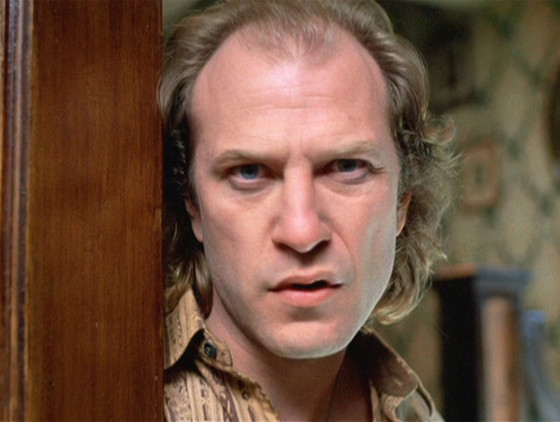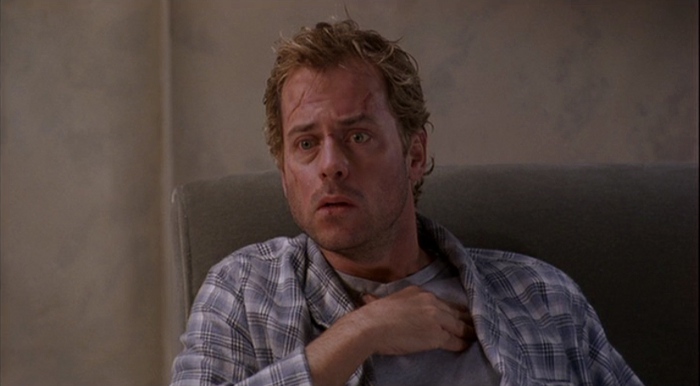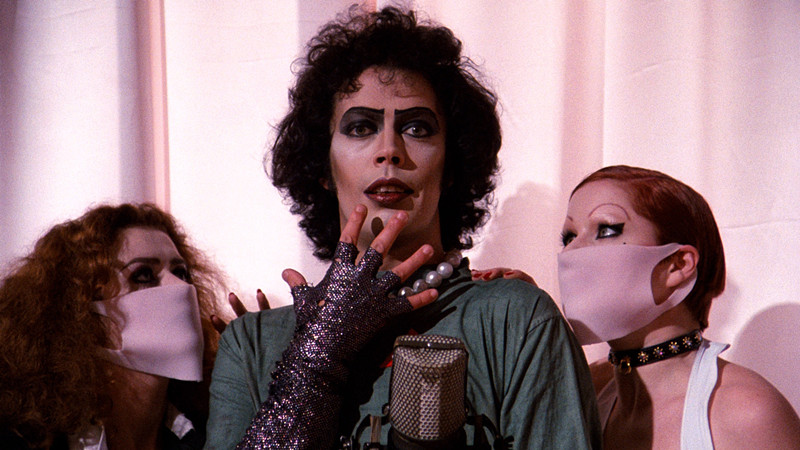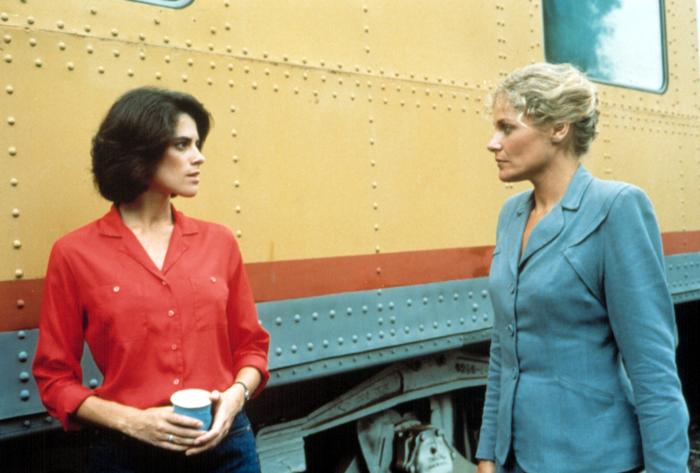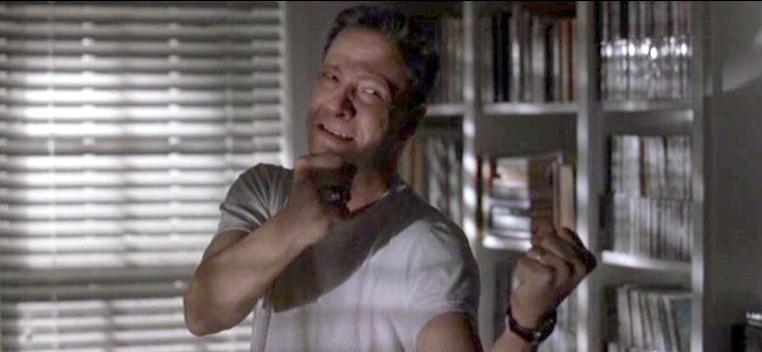12. The Silence of the Lambs (1991)
Character: Buffalo Bill
Ask someone about 1991’s Oscar sweeper and they’ll tell you about Hannibal Lecter and fava beans, or Clarice Starling and her desperate search for a kidnapped politician’s daughter at the hands of psychotic serial killer Buffalo Bill. But the underlying layers of Silence, is one of metamorphosis. After all, why is Buffalo Bill ritualistically keeping overweight women in a deep pit before killing them? Why does he skin them?
According to Dr. Lecter, it’s because Bill wants to be a woman. He wants to change, to transform. That explains all the rare butterflys and moths Bill uses in his killings; symbols of his desire to metamorphose into a woman. In one of the greatest and creepiest scenes in film history, Bill puts on his suit of human skin and dances to “Goodbye Horses” by Q Lazarus mouthing the words, “I’d fuck me.” He is literally trying to change into female form by way of creating himself a female skin suit.
Clarice and Lecter find clues to his identity by searching applications for sex change surgeries. At the bottom of one of the sickest and scariest killers ever, there lies a man with the fundamental need to be a woman. In some strange distant alternate universe, Bill could be like many other characters discussed on this list; Bree from Transamerica, or Bernadette from Priscilla Queen of the Desert. Knowledge of other serial killers who sexual repression and gender confusions lead to their homicidal rages makes watching Bill in SOTL more believable and frightening.
11. As Good As It Gets (1997)
Character: Simon Bishop
James L. Brooks’ multi-Oscar winning film has it all. Jack Nicholson as an obsessive compulsive neurotic writer, check! Helen Hunt as a desperate mother of a sick child struggling with the healthcare system and a crotchety customer, check!
The glue, the conscience holding everything together is Simon, the gay artist who lives next door to Nicholson’s Melvin Udall with his annoying little dog. After he is savagely beaten and robbed by a group of thugs, Simon goes to the hospital where his lack of insurance leaves him bankrupt and homeless. Greg Kinnear gives an incredible performance as Simon. The three embark on a road trip to Baltimore where Simon is forced to ask his parents for money, the same parents who don’t pick up the phone when he calls, because of the shame they feel.
In the film that won the Best Screenplay Oscar, maybe the best line is uttered by Simon, when he says, “If you stare at someone long enough, you discover their humanity.” He discovers the humanity in Melvin, who goes from your typical grouchy bigot at the beginning to Simon’s savior at the end. They exchange the perfect tit-for-tat at the end, when Simon says, “I love you” and Melvin’s response is simply, “I’d be the luckiest guy in the world if that did it for me.”
10. Rocky Horror Picture Show (1975)
Character: Dr. Frank N Furter (et. al.)
Come on! How can we not include the film that features Tim Curry introducing himself to audiences by singing “Sweet Transvestite” (from Transsexual, Transylvania). Janet & Brad are newlyweds whose car breaks down right next to the big scary castle operated by Dr. Frank N Furter.
The horror-comedy musical is a full on sexual experience, as Frank the transvestite seduces both Janet & Brad separately, and the creation, an aptly named Rocky Horror shows off his “Sword of Damocles”. To discuss more of the plot would be inane as the film is just a wacky and wild mid 70s cosmic adventure.
What is important is that this film made it cool to dress up as crazy characters and go out in public. It made it okay to express yourself in ways that conventional society seems taboo. And it let you know that you were not alone, as the film took over midnight movie screenings and can still be found in certain theatres today nearly 40 years after its release.
9. V for Vendetta (2005)
Character: Valerie
We only know Valerie in flashbacks. We know that in totalitarian England in the not so distant future that homosexuality is a sin akin to Judaism in Nazi Germany. We watch her father throw her baby pictures in the garbage. We watch her cry when her lover is taken by the police. And we watch her total submission as the cops come for her and she’s dragged to Larkhill detention center to await her death and mass burial.
It is her “diary” written on toilet paper that Natalie Portman’s Evey finds and reads while incarcerated. It’s her narrative that allows Evey to become one with her situation and become V’s partner in bringing down the regime’s ruthless autocrat of Adam Sutler.
Valerie’s impassioned plea at the end of her toilet paper diary, sums up the feelings of the filmmakers and the characters fighting against all sorts of dictatorial governments and close minded people: “But what I hope most of all is that you understand what I mean when I tell you that even though I do not know you, and even though I may never meet you, laugh with you, cry with you, or kiss you. I love you. With all my heart, I love you. –Valerie”
8. Desert Hearts (1985)
Character(s): Cay & Vivian
Vivian has moved to Nevada to get a divorced and moves into a boarding house for women waiting for their divorces to go through. She’s as straight laced as possible, an English professor from NYC, plus its 1959. Gay, lesbian, transgender… these are not common place terms of the late 50s.
Vivian is strictly pre-sexual revolution. Cay is a wild card, living on the ranch; she works in a Reno casino and frequents many a lover. There’s a scene early in the film where Vivian walks by and is invited in and is shocked to see a half-naked woman in Cay’s bed. When they go for a drive in the rain and kiss, Vivian doesn’t know how to act. When the grouchy old lady who runs the ranch sees them driving up the following morning she kicks Vivian out for having “that kinda lifestyle.”
Cay tracks Viv to her hotel and they end up having one of the earliest mainstream same sex loves scenes. It’s touching and beautiful as Cay helps Vivian come to terms with something altogether new. How do they leave things? What will happen in the future? The film leaves us with them together but only for one last train stop…
In 1985, this was a landmark film for the GLBT community, not just for the love scenes, but also the possibility of a happy ending for GLBT people. In the Reagan years, with AIDS funding being slashed, and the “gay plague” haunting their communities, Desert Hearts was and is an important and noteworthy film.
7. American Beauty (1999)
Character: Col Frank Fitts, USMC
Kevin Spacey won an Oscar for his portrayal of Lester Burnham, a suburban man whose boring life is woken by the sight of his teenage daughter’s promiscuous friend. Soon it’s full blown mid-life crisis; complete with quitting his job, buying a car and a new passion for working out.
Then there are the neighbors. The Fitts family is as straight laced as humanly possible. Ricky, the son, goes to school with Lester’s daughter and is the “creepy kid” at school. There are rumors about what caused him to miss time in an institution. Frank is a former US Marine who runs his house like an extension of the military. His wife is totally desensitized. She barely responds to direct questions and stares blankly into space. There are gay neighbors that Lester runs with in the morning much to Frank’s chagrin.
What Frank doesn’t know is Ricky and Lester smoke pot together, and that Ricky’s habit of filming everything includes a video of Lester in full crisis mode, stripping naked and lifting weights. Frank physically and emotionally beats his family. We watch as he snaps and punches Ricky for touching his secret Nazi china plate. When he finds the Lester workout video he thinks Ricky’s gay and beats him again.
It all comes to a head during the final scenes as Frank confronts Lester soaked from a rain storm. Lester, being neighborly, tries to help only for Frank to kiss him. When Lester turns him away, Frank slowly stalks off. He has no other recourse now. When you’ve lived a life in hiding and shame as long as Frank has, surrounded by military stereotypes and prejudices, it becomes very easy to lose all bearings of control. Lester is shot and murdered and we find out it was Frank.
Interestingly, according to IMDB, there were added stories in the script of Frank having a gay lover while in the USMC in Vietnam. This film depicts an almost perverse irony: Many anti-gay, homophobic people are constantly espousing the idea that homosexuality destroys the family unit, and yet what many of these films accurately show, is that it’s the denial of one’s own identity and the pretending to be straight can be even more harmful and dangerous to families.
